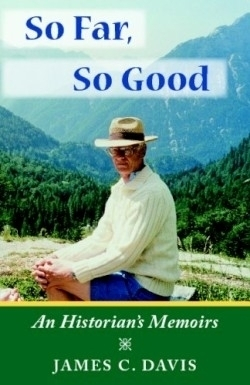So Far, So Good
An Historian's Memoirs
Man is the keeper of history. After all, what are history books but man’s interpretation and retelling of facts? In So Far, So Good, historian James C. Davis steps away from exploring other people’s lives and takes a stab at his own. Thankfully, his own life is as rich as anyone else’s. This is a man who attended Princeton and spent his Army days in gorgeous Italy. Along the way, Davis not only chronicles what he has seen and experienced but also poses some serious questions about where Man has been, where he will go, and what he will learn from the past.
Philosophical asides are the shining beacons of this memoir. These moments are what turn this book into something special. Davis not only explains the literal events of his life but also explains how his view “enlarged” enough so that he could see not only the literal events but their greater meaning. For example, Davis’s discussion of his childhood neighborhood and how he lived in the zone between the poor and the rich neighborhoods is incredibly interesting and significant. His realization that in the pursuit of answers one finds more questions is an important one, something that guides both this memoir and his career.
Davis’s writing is sharp, and the memoir is focused and concise, but it is almost too linear. He walks readers through a chronological telling of his life: from childhood to prep school and on to college, Army life, and marriage. The one creative flourish to the memoir’s structure is his use of footnotes. More description and background information could have been included in these footnotes, but their very appearance speaks to this man’s passion: the telling and retelling of history.
Often the memoir feels like a skeleton: the meaty flesh is missing from scenes and anecdotes. For example, he tells readers that he fell in love with an Italian woman named Elda, but he describes little of their courtship. Similarly, Davis mentions his disconnect from religion after encountering Bertrand Russell’s essay, “A Free Man’s Worship.” Though the included quotation is rich, Davis moves on before the important moment is completely described.
Davis has led a life full of travel, love, and war. He is correct when he writes, “You know that Chinese curse, ‘I wish that you will live in interesting times’? We do.” Forever the historian, Davis proves that the common man can have extraordinary experiences.
Disclosure: This article is not an endorsement, but a review. The publisher of this book provided free copies of the book and paid a small fee to have their book reviewed by a professional reviewer. Foreword Reviews and Clarion Reviews make no guarantee that the publisher will receive a positive review. Foreword Magazine, Inc. is disclosing this in accordance with the Federal Trade Commission’s 16 CFR, Part 255.

